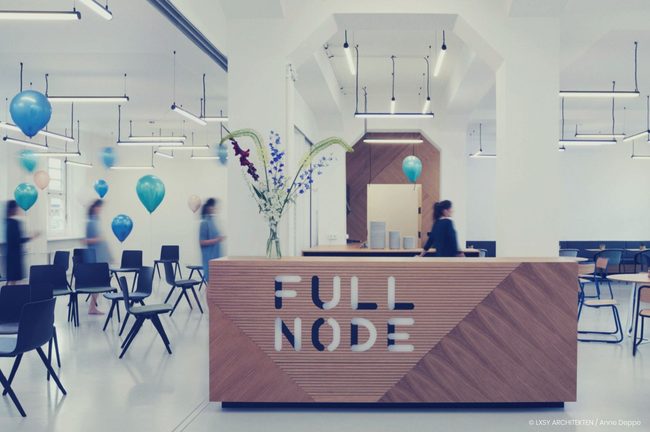Construction is notoriously a conservative domain. It’s among the least digitized sectors, but also one of the most wasteful, generating 35 percent of the global landfill mass. Yet, with the rise of urbanization and population around the world, the need for new buildings, hence, construction, is direr than ever. Over the next 80 years, the booming global communities will require two billion more homes to accommodate their new needs.
These unprecedented challenges, coupled with the pressing need to digitize and innovate, mean construction is ripe for disruption. Blockchain, one of the most ubiquitous technologies of Industry 4.0, can help.
What is Blockchain?

A blockchain is the marriage of a “block” and a “chain”, within a database shared across a network of computers. The block includes a record, which can contain information about any exchange, such as a deal or a financial transaction. The chain is where all the blocks are linked together.
Once a record is a part of a chain, it’s extremely difficult to tamper or change it. The network keeps updating itself and making changes to ensure that all the copies in the database are the same. Thus, blockchain is an incorruptible and decentralized public ledger to store digital information.
How is Blockchain Relevant to Construction?

Blockchain rose to fame as the technology behind BitCoin. While these technologies took the financial world by storm, cryptocurrencies are just one of the countless applications of blockchain.
It’s possible to tap into blockchain technologies in any sector where interactions and transactions occur. A single block can usually contain up to 1 MB of data, meaning that a it alone can contain the information of thousands of transactions.
The construction is a process that requires many professionals who need to collaborate and exchange data for designing, implementing, and operating projects. When this complexity is what makes construction a conservative and inefficient sector, it also means construction is an ideal field to benefit from blockchain technologies.
Blockchain can help to carry construction to the Industry 4.0 standards by accelerating efficiency, and keeping the practices accountable and transparent — also greener.
Efficiency at Any Stage of Project Development
At its core, blockchain is an information technology and a bookkeeping revolution that can adapt to structural problems of construction.
In a sector dominated by paperwork like bids, tenders, contracts, permissions, claims, and many more administrative details, blockchain can automate and optimize many of these processes. Project managers can integrate their Building Information Model (BIM) data with blockchain technologies. These can provide a comprehensive platform where project design, administration, and management transactions simultaneously happen.
Another powerful blockchain-based innovation is the so-called “smart contracts“, which allow the exchange of anything of value ethically while avoiding the services of a middleman like a lawyer or a notary.
In construction, smart contracts can improve and automate a diverse range of tasks, from planning to final touches. For instance, a construction laborer enter can trigger a process by entering the site using the ID card for security, health, and safety reasons. The blockchain-powered system can register how much time they spend working and process a smart contract to automate their payment. Even though this is a straightforward example, developers can scale up the blockchain technologies in countless different ways to make every stage of the construction much more efficient.
Keeping Stakeholders Accountable and Transparent
From regulators, builders, designers, insurers, or lawyers, construction is a multi-faceted team effort. Trust among all these stakeholders is what oils the engine to run the operations smoothly.
As a database architecture technology, blockchain allows every stakeholder to streamline and manage all the data in one reliable and incorruptible ledger. It can bridge the gap of trust by facilitating information exchange via chronological record keeping. Furthermore, the blockchain system is far cheaper than any other shared database system, such as regular cloud solutions.
According to Scott Nelson, CEO of Sweetbridge, a blockchain-based economic framework, the nature of construction makes it a uniquely good fit for taking advantage of blockchain.
Classic project management techniques still work, but projects can benefit from a more decentralized and agile approach, where transparency is high, and parties can be compensated for outcomes as well as for work performed.
Scott Nelson, CEO of Sweetbridge in Harvard Business Review
Greener, More Ethical, and Cheaper Buildings

The construction sector is a significant source of pollution and carbon emissions. It causes more water and air pollution incidents than any other industry. Constructions and buildings are responsible for 39 percent of all carbon emissions in the world, with operational emissions accounting for 28 percent.
While the awareness about greener practices is on the rise, sustainable construction is yet to go mainstream. However, blockchain can help to accelerate this process globally.
Blockchain can act as a passport for the building materials. The information about each construction product will allow developers to make better decisions about sustainability issues by helping them to calculate a building’s life cycle, reduce environmental impact, or recycle materials.
Access to product history will also enable project managers to see whether raw materials or products come from ethical sources. Thus, blockchain can be a dominant force to drive the circular economy in construction and embolden positive behavior change.
In the meantime, greener and more efficient construction projects enable significant cost savings with overheads, administration, and project control.
Early Stages of Development with Immense Potential

Often hailed as the “new internet”, the world is just becoming aware of the endless ways in which blockchain can add value to humanity. By 2025, blockchain will contribute more than USD 176 billion, and these figures will exceed USD 3.1 trillion by 2030.
However, as construction yearns for improvement to meet the time’s challenges, there’s no doubt this disruptive technology arrived just in time to aid this process.







